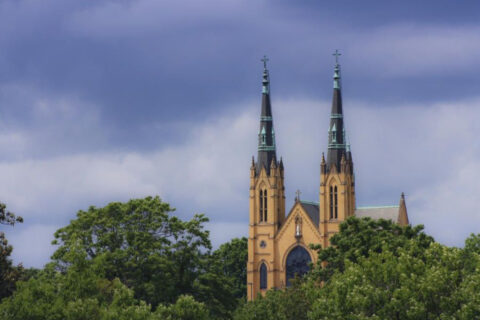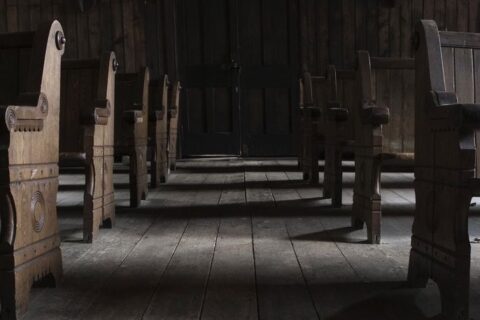In giving his overview of the general lifecycle of a nation/ethnos, Kaisar made the observation that:
In more ways than one, it would be best if a nation-state could remain within the Age of Conquests for as long as feasible. This is the best stage for sustainment, decent lives for the citizens, decent morality, with struggle (but of a nature that is not as difficult as the struggles of the founding or decadence), but no weakening of the men.
In other words, the Age of Conquests is where almost all dissidents would like to be. It is where a sustainable system needs to reside. We cannot remove the struggle aspect from life or we will enter the downward spiral to collapse. We must remain in the “hard times”, but in the best stage of the hard times. This does not mean we need to constantly be in military conflict, but we do need to constantly be in some form of a struggle for national betterment and dominance in some discipline, alongside a proper focus and culture. Only the Age of Conquests can give us that.
Recognizing how destructive unnecessary wars are for a people, how can Dixie or any other keep from falling into the decadence the comes with peace and affluence without warfare? The answer is found in the Christian Faith, in the asceticism to which the Church calls all of her children to keep vigilantly while living in the world, and particularly in monasticism, which is a heightened practice of Christian asceticism.
Prof. Georgios Mantzarides elaborates:
St [John] Chrysostom is particularly emphatic on this point: “You greatly delude yourself and err, if you think that one thing is demanded from the layman and another from the monk; since the difference between them is in that whether one is married or not, while in everything else they have the same responsibilities… Because all must rise to the same height; and what has turned the world upside down is that we think only the monk must live rigorously, while the rest are allowed to live a life of indolence” 7. Referring to the observance of particular commandments in the Gospels, he says: “Whoever is angry with his brother without cause, regardless of whether he is a layman or a monk, opposes God in the same way. And whoever looks at a woman lustfully, regardless of his status, commits the same sin”. In general, he observes that in giving His commandments Christ does not make distinction between people: “A man is not defined by whether he is a layman or a monk, but by the way he thinks” 8.
Christ’s commandments demand strictness of life that we often expect only from monks. The requirements of decent and sober behaviour, the condemnation of wealth and adoption of frugality 9, the avoidance of idle talk and the call to show selfless love are not given only for monks, but for all the faithful.
Therefore, the rejection of worldly thinking is the duty not only of monks, but of all Christians. The faithful must not have a worldly mind, but sojourn as strangers and travellers with their minds fixed on God. Their home is not on earth, but in the kingdom of heaven: “For here we have no lasting city, but we seek the city which is to come” 10. The Church can be seen as a community in exodus. The world is its temporary home but the Church is bound for the kingdom of God. Just as the Israelites, freed from bondage in Egypt, journeyed towards Jerusalem through many trials and tribulations, so Christians, freed from the bondage of sin, journey through many trials and tribulations towards the kingdom of heaven.
Despite the similarities between the married and the monastics, the monastic longs for something more – for the full enjoyment of the Kingdom of Heaven, the undistracted pursuit of Christ. Mother Ephrosynia of Lesna, France, provides this quotation to illustrate the depth of the monk’s or nun’s desire in her essay on monasticism:
Some people are very single-minded by nature. And there are ideas that permeate the lives of such people down to the very last detail. Everything is beautiful, joyous and of consolation, but this life is overshadowed for them by the memory of one thing, by a single thought: that of Christ Crucified. No matter how bright the sun might be, how beautiful nature, God’s creation is, how tempting far-away places might seem, they remember that Christ was crucified, and everything is dim in comparison. We might hear the most beautiful music, the most inspired speeches, but these souls hear one thing: Christ was crucified, and what can ever drown out the sound of the nails being hammered into His flesh? Describe to them the happiness of a family life, of a beloved husband or wife, of children, but Christ was crucified, and how can we not show the Lord that He isn’t alone, we haven’t deserted Him. There are those that are willing to forget everything in the world so as to stand by His Cross, suffer His suffering and wonder at His Sacrifice. For them the world is empty, and only Christ Crucified speaks to their hearts. And only they know what sweetness they taste still on this earth by sharing in the eternal mystery of the Cross, and only they hear what He says to them when they come to Him after a life full of incomprehensible hardships and inexplicable joy.
This longing gave rise to organized monasticism:
The monastic life, with its physical withdrawal from the world to the desert, began about the middle of the third century. This flight of Christians to the desert was partly caused by the harsh Roman persecutions of the time. The growth of monasticism, however, which began in the time of Constantine the Great, was largely due to the refusal of many Christians to adapt to the more worldly character of the now established Church, and their desire to lead a strictly Christian life. Thus monasticism developed simultaneously in various places in the southeast Mediterranean, Egypt, Palestine, Sinai, Syria and Cyprus, and soon after reached Asia Minor and finally Europe (Mantzarides).
And it is within the monastic way of life that the multitudes of the nations can experience the hardships necessary for a healthy society to exist without resorting to military warfare with other countries:
There are sighing and tears produced by the presence of sin, as well as the suffering to be free of the passions and regain a pure heart. These things demand ascetic struggles, and undoubtedly have a negative form, since they aim at humility. They are exhausting and painful, because they are concerned with states and habits that have become second nature. It is however precisely through this abasement, self purification, that man clears the way for God’s grace to appear and to act within his heart. God does not manifest Himself to an impure heart (Mantzarides).
. . . sooner or later “reality” strikes and you see that everything that’s been written about the hardships of monastic life is not just fancy words or symbolic phrases or allegory. It’s not the physical side that’s hard. With some effort and discipline anyone can learn to get up early and to stand through long church services, to make prostrations and to work, and work hard, at jobs that you don’t necessarily like. A lot of people in the world have a much more difficult life in that sense. It’s the encounter with yourself and who you really are and the struggle to change that, that is the slow but painful, day by day, minute by minute work of the monk. The work is done largely through our contacts and conflicts with other people. St. John of the Ladder is very blunt about this: “… Derided, mocked, jeered, you must accept the denial of your will. You must patiently endure opposition, suffer neglect without complaint, put up with violent arrogance. You must be ready for injustice, and not grieve when you are slandered; you must not be angered by contempt and you must show humility when you have been condemned.” For most of us the most difficult element in all this is giving up your own will. One of the most quoted monastic sayings, that of Abba Dorotheos—another great teacher of the monastic life—says: “I know of no fall that happens to a monk that does not come from trusting his own will and his own judgment… Do you know someone who has fallen? Be sure that he directed himself… Nothing is more grievous… nothing is more pernicious” (Mother Ephrosynia).
The monastery as a ‘boot camp’ for the Christian – with its unsparing breaking down and reformation of the whole person, body and soul – may be discerned in the foregoing passages. The martial nature of monasticism is further seen in the not uncommon act of soldiers becoming monks. St Guthlac, the scourge of demons who made the swamps of Crowland, England, the place of his monastic struggles, and St Pachomius of Egypt, the founder of cenobitic monasticism, are a couple of the more prominent ones.
Misunderstandings cause some folks to frown at monastic life, however. Common objections to it are that it is an attempt to earn salvation solely by one’s works and that it is a Gnostic sort of rejection of the physical world.
Prof. Mantzarides answers the first charge this way:
The Christian life does not depend only on human effort but primarily on God’s grace. Ascetic exercises in all their forms and degrees aim at nothing more than preparing man to harmonise his will with that of God and receive the grace of the Holy Spirit. This harmonisation attains its highest expression and perfection in prayer. “In true prayer we enter into and dwell in the Divine Being by the power of the Holy Spirit” 22. This leads man to his archetype and makes him a true person in the likeness of his Creator.
To the second charge he offers these passages:
Monks . . . choose to constrain their bodily needs in order to attain the spiritual freedom offered by Christ. They tie themselves down in death’s realm in order to experience more intensely the hope of the life to come. They reconcile themselves with space, where man is worn down and annihilated, feel it as their body, transform it into the Church and orientate it towards the kingdom of God.
The monk’s journey to perfection is gradual and is connected with successive renunciations, which can be summarised in three. The first renunciation involves completely abandoning the world. This is not limited to things, but includes people and parents. The second is renunciation of the individual will, and the third is freedom from pride, which is identified with liberation from the sway of the world 24.
These successive renunciations have a positive, not a negative meaning. They permit a man to fully open up and be perfected “in the image and likeness” of God. When man is freed from the world and from himself, he expands without limits. He becomes a true person, which “encloses” within himself the whole of humanity as Christ himself does. That is why, on the moral plane, the Christian is called upon to love all human beings, even his enemies. Then God Himself comes and dwells within him, and the man arrives to the fullness of his theanthropic being 25. Here we can see the greatness of the human person, and can understand the superhuman struggles needed for his perfection.
One could also answer the Gnostic charge by looking at an event from the life of one of Ireland’s great monastic saints, St Kevin of Glendalough (+618 A.D.). In his life, it is recounted that when he was living in a valley of the Wicklow Mountains, he had a specially tender encounter with a blackbird:
Once during Lent, Saint Kevin stood praying in his hut with his hand sticking out of the window. Just then a blackbird nested in his hand and laid an egg. So gentle and compassionate was the Saint that he remained in this position until the eggs hatched and the fledglings were able to fly away.
If monks and nuns had a hateful attitude toward the world, St Kevin would have thrust the blackbird away from him. But he did not, and there is furthermore an abundance of these kinds of interactions with creatures in the lives of other monastic saints like St Columba of Iona, St Seraphim of Sarov, et al. And this is besides their service to man, in offering him spiritual counsel, food and shelter for those in need, education, and so forth.
Kaisar and others are correct in seeing that some level of hardship and struggle is needed for maintaining a healthy society. The ascetic ethos of traditional Christianity, and especially of its monastic life, provides those beneficial trials. And the South, being inclined toward fighting as she is, would seem to be a place where it could readily flourish, just as it did with our forebears in England:
By presenting religious life primarily as a ceaseless struggle against the “Ancient Foe,” monastic spirituality awakened widespread reverberation within a warlike society whose secular ethic . . . favored related values (André Vauchez, quoted in Robert Boenig, ‘Introduction’, Anglo-Saxon Spirituality: Selected Writings, Boenig trans., Mahwah, Nj., Paulist Press, 2000, p. 42).
How long might a country last that lives in such a way? The 1,100-year life of Constantinople/New Rome suggests the lifespans that are possible. May the poetic words of a renowned monk of that great city and empire inspire many Dixians to consider embracing the life of Christian asceticism and monasticism:
Mortals, escape with me from a false world!
Christ calls. Away! Life be our voyage fair,
Safe riding o’er the surge of cares and lies!
One quest alone employs the lonely Monk,
How he may reach the Haven of true peace,
Where never comes the strain of breaking hearts.
O happy life, all music, free from sorrow!
Where is the prudent seeker of true gain
Will part with all the world and choose the Cross?
–St. Theodore the Studite (quoted by Mother Ephrosynia)
-By Walt Garlington

O I’m a good old rebel, now that’s just what I am. For this “fair land of freedom” I do not care at all. I’m glad I fit against it, I only wish we’d won, And I don’t want no pardon for anything I done.






Great article with some fascinating thoughts. Christianity is definitely an essential, there is no question on that. And the monastery approach is equally useful. Thanks Walt.